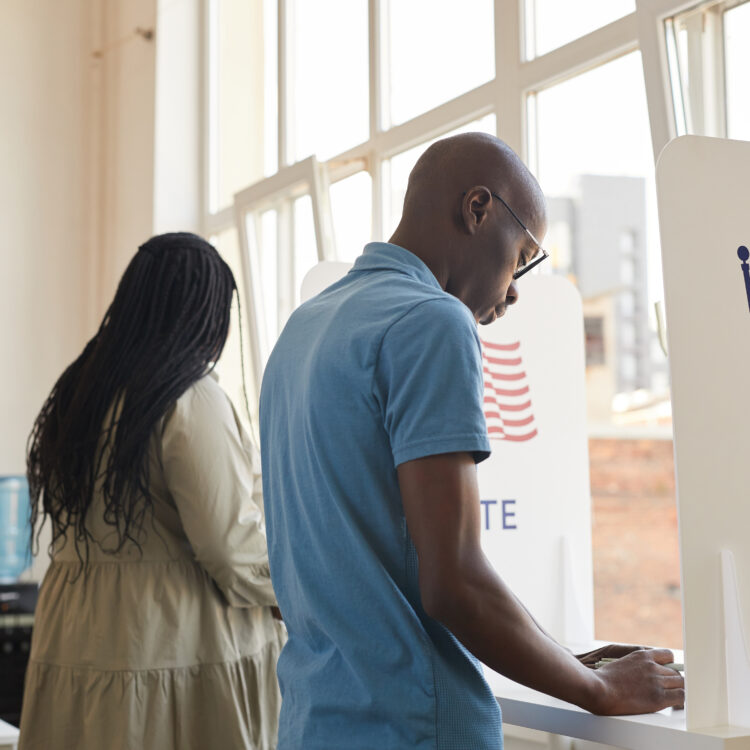Survivors Vote 2022: By the Issues Guide

Victims/survivors of violence are a critical voice for justice, safety, and healing at the ballot box. This guide was created to empower our community with information about key issues impacting victims/survivors in the upcoming election and which elected officials have the power to make decisions about those issues.
Victims/survivors are diverse in their backgrounds and experiences, and we recognize that they will be impacted by these issues in different ways.
There are many different perspectives on voting. Some view voting as an essential civic duty to uphold our democracy. Others view voting as perpetuating systemic and historical harms. Others, still, view voting as a way to minimize the harm of unjust systems where possible while simultaneously working to dismantle those systems. This guide is meant to support people with information to make informed decisions about those representing them in local, state, and federal offices—not to replace the vital work of challenging systems and seeking liberation.
We hope this resource will support you during the 2022 Election.
Reproductive Freedom
The right to choose to have or not have an abortion is important for victims/survivors of sexual violence. When someone experiences sexual violence, they can feel a profound loss of power over their own body. They may also fear becoming pregnant from the sexual violence they experienced. Being able to choose whether or not to keep or terminate a pregnancy is one way victims/survivors can reclaim power over their own body. This is regardless of whether the pregnancy is due to the sexual violence they experienced or from consensual sex. All victims/survivors should have the right to choose what happens with their bodies and whether to keep or terminate any pregnancy.
Related Policies:
- Ensuring abortion remains legal and accessible across Minnesota
- Expanding abortion access across Minnesota
- Increasing availability and accessibility of reproductive healthcare and contraception
County Attorneys can:
- prosecute or not prosecute people who seek or provide abortions if abortion becomes a crime in Minnesota or in the US
Attorney Generals can:
- support or work to halt extradition to other states for abortion care providers or people who come to Minnesota for an abortion
- sue the federal government for unjust laws, including abortion bans
State Senators and Representatives can:
- pass legislation that regulates, restricts, or expands access to abortion services
- work to change the state constitution to remove the right to an abortion in Minnesota
Governor can:
- sign or veto legislation that state lawmakers pass on abortion regulation
- issue Executive Orders related to abortion care
- appoint Minnesota Supreme Court Justices (see below)
Minnesota Supreme Court Justices can:
- uphold or remove the right to abortion in the state constitution (Note: These justices are appointed by governor but the public votes on if they will remain on the Supreme Court).
Support for Transgender Youth
Transgender youth experience disproportionate rates of sexual violence and sex trafficking compared to their cisgender peers. Trans youth experience high rates of gender-based bullying, discrimination, and abuse across a variety of public and private settings: in school, sports, restrooms/locker rooms, and at home. This increases the possibility that trans youth will experience interruptions in their education, experience housing instability, and have negative encounters with the criminal legal system. This also leads to greater risk for sexual violence and sex trafficking. Protective measures, such as supportive schools, nondiscrimination and anti-bullying policies, bans on conversion therapy, and cultures where trans youth are supported, can decrease risks and prevent sexual violence.
- Banning conversion therapy
- Implementing nondiscrimination and anti-bullying efforts in schools
- Creating gender inclusive school curriculums
- Supporting trans youth to participate in sports
State Senators and Representatives can:
- pass legislation that supports or harms trans youth
- pass legislation to ban conversion therapy across Minnesota
Governor can:
- sign or veto legislation that state lawmakers pass related to trans youth
- appoint the Education Commissioner who leads the Minnesota Department of Education, which implements education policies and develops state curriculum standards
City Council Members/Mayors can:
- pass city-wide ordinances on issues affecting trans youth, such as conversion therapy bans or access to gender inclusive public bathrooms
School Boards Members can:
- create policies and prescribe courses of study for individual school districts, such as gender inclusive comprehensive sexuality education
Government Systems and Community Programs
Government systems and community-based programs are both important components of responding to and preventing sexual violence. Victims/survivors of sexual violence seek justice and healing in different ways. Some work with the criminal legal system by reporting to law enforcement and working with prosecutors. Others need more immediate support, such as medical care or basic needs like food and shelter. Historically, much emphasis has been placed on the criminal legal response, focusing on reforming criminal sexual conduct statutes and increasing penalties for perpetrators. However, many victims/survivors do not want to engage with the legal system, and seek alternatives to policing and incarceration. Victims/survivors of sexual violence are the experts in their own lives, and should have access to the resources and supports they prefer.
- Increasing funding and resources for community-based programs and organizations that provide alternatives to the criminal legal response (e.g. restorative justice, culturally specific healing)
- Strengthening criminal and civil laws related to sexual violence
- Eliminating structural barriers that prevent victims/survivors from seeking or receiving support and healing
- Implementing and strengthening training requirements for law enforcement, including trauma-informed interviewing techniques
- Expanding funding for and access to crime victims services, including rape crisis centers, medical forensic examiners, and crime victims reparations programs.
County Sheriff can:
- determine priority areas for the county Sheriff’s department
- set the tone for how Sheriff’s deputies train for and respond to sexual assault reports
- work with the County Attorney to build cases against perpetrators
County Attorney can:
- determine priorities for County Attorney’s office, such as number of assistant county attorneys assigned to sexual assault cases and whether to devote time and resources to sexual assault cases
District Judges can:
- have a role in the prosecution and sentencing of perpetrators
State Senators and Representatives can:
- vote on proposed legislation related to funding and requirements for law enforcement and prosecution, as well as funding for community-based programs
- pass legislation to change to criminal statutes
Governor can:
- Sign or veto legislation around law enforcement, prosecution, and community alternatives
Comprehensive Sex Education
Comprehensive Sex Education (CSE) is a fundamental component in both sexual violence prevention and intervention. CSE is critical to stopping violence before it occurs through education on topics such as consent, healthy relationships, and safe sex practices. By implementing CSE across Minnesota, we can help shift cultural norms to emphasize safety, consent, equality, and reduced perpetration. CSE provides youth with valuable skills, such as how to inform a trusted adult about inappropriate or abusive behavior and identify red flags in relationships. Finally, CSE offers victims/survivors who are children the language to name and understand what they experienced.
- Establishing education that is evidenced-based, scientifically and medically accurate, and age- and developmentally appropriate
- Implementing curriculum that is gender diverse, culturally responsive, and intersectional
- Improving access to reproductive health care and contraception
School Board can:
- decide whether or not comprehensive, inclusive, medically-accurate, and culturally responsive programming will be offered to students
Governor can:
- appoint the Commissioner of Education who leads the Minnesota Department of Education, which implements education policies and develops state curriculum standards
State Senators and Representatives can:
- introduce and pass bills that support statewide CSE
Crime Victim Services Funding
Crime victim services funding is awarded to rape crisis centers, coalitions, and other advocacy organizations to provide services for victims of sexual assault, domestic violence, child abuse, and general crime. Service providers rely on this funding to continue operations. There has not been an increase to base funding for crime victim services in eight years, preventing agencies from offering competitive wages, thereby leaving agencies understaffed and unable to provide the breadth and depth of services victims/survivors need. Sexual assault advocacy requires extensive training and experience, and should be compensated fairly. Some of these funds also cover expenses like housing, transportation, and other basic needs for victims/survivors.
- Increasing funding for community-based services, such as rape crisis centers
- Increasing funding for and access to direct payments to victims/survivors
- Providing funding for restorative justice and culturally-specific healing practices
State Senators and Representatives can:
- vote on proposed legislation related to funding and programming
Governor can:
- Sign or veto legislation related to funding and programming
- Appoint Commissioner of Public Safety, whose department oversees crime victim services funding
Childcare Funding
If a victim/survivor with children can’t afford childcare, they may be less likely to leave an abusive situation. Economic empowerment is a proven protective factor against violence. Funding childcare means that people retain more of their incomes—which leads to greater financial freedom and more personal autonomy. Many victims/survivors also experience increased financial burdens long after experiencing violence. Financial support through childcare funding is critical for victims/survivors’ continual healing.
- Expanding universal early learning programs
- Expanding head start program serving low income students
- Offering tax credits for families
- Providing scholarships for kids to attend early learning facilities
- Supporting and training childcare workers
Governor can:
- make budget recommendations to congress for the next two years that include funding for childcare
State Senators and House Representatives:
- create and pass legislation that includes state funding for childcare
Victims/Survivors in Custody and Prison Rape Elimination Act (PREA)
People in confinement settings, such as prisons and jails, are far more likely to experience sexual violence than those in the community. People entering correctional facilities have likely been a victim of violence themselves. Nationally, nearly 60% of people in women’s prisons have a history of physical or sexual abuse prior to incarceration (ACLU). Elected officials make decisions regarding how jails and prison respond to survivors in custody and how invested their community is in the carceral system.
- The Prison Rape Elimination Act (PREA) puts forward standards for confinement settings to prevent, detect, and respond to sexual violence
- Beyond PREA, funding decisions made by elected officials demonstrate priorities in providing supportive measures to inmates and investments or divestments in the carceral system
Governor can:
- appoint the Commissioner of the Department of Corrections
- develop a budget for state prisons and the Department of Corrections
- submit PREA compliance certification to the federal government detailing if the state complied with PREA standards
County Sheriff can:
- oversee county jails
- investigate sexual violence that happen in county jails
County Boards/County Commissioners can:
- make funding decisions regarding county jails
- appoint commissioners for regional jails which house inmates across multiple, often rural, counties
- Serves on County Committee and Advisory Boards, such as the Race Equity Committee; Law, Justice, and Safety Committees

Need Support?
Check out our voting support resources for more information about how to vote and tools to support you at the ballot box.
